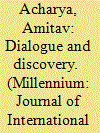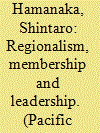|
|
|
Sort Order |
|
|
|
Items / Page
|
|
|
|
|
|
|
| Srl | Item |
| 1 |
ID:
105925


|
|
|
|
|
| Publication |
2011.
|
| Summary/Abstract |
Scholars of International Relations (IR) increasingly realise that their discipline, including its theories and methods, often neglects voices and experiences outside of the West. But how do we address this problem and move the discipline forward? While some question whether 'Western' and 'non-Western' (or 'post-Western') are useful labels, there are also other perspectives, including those who believe in the adequacy of existing theories and approaches, those who argue for particular national 'schools' of IR, and those who dismiss recent efforts to broaden IR theory as 'mimicry' in terms of their epistemological underpinnings. After reviewing these debates, this article identifies some avenues for further research with a view to bringing out the global heritage of IR. These include, among other things, paying greater attention to the genealogy of international systems, the diversity of regionalisms and regional worlds, the integration of area studies with IR, people-centric approaches to IR, security and development, and the agency role of non-Western ideas and actors in building global order. I also argue for broadening the epistemology of IR theory with the help of non-Western philosophies such as Buddhism. While the study of IR remains dominated by Western perspectives and contributions, it is possible to build different and alternative theories which originate from non-Western contexts and experiences.
|
|
|
|
|
|
|
|
|
|
|
|
|
|
|
|
| 2 |
ID:
192173


|
|
|
|
|
| Summary/Abstract |
Drawing inspiration from a Chinese proberb, this paper offers an alternative interpretation of regionalism, with a special reference to its membership. This alternative interpretation provides insights into the exclusionary aspect of regionalism, for which mainstream international relations theories lack a certain efficacy in providing plausible explanations. We hypothesize that a state forms a regional group in which it can be a leader, excluding states that are more powerful than it is. A state values the leading position in a regional group, even in a small regional group. To test the hypothesis, this paper investigates regionalism launched in Asia during the second half of 20th century, with special attention to the inclusion and exclusion of the US. By analyzing diplomatic records obtained at four national archives (Australia, Japan, the UK, and the US), as well as memoirs by retired officials and other studies, this paper shows that regionalism in Asia was often pursued in an exclusionary manner, mainly by Japan, and to a lesser degree by Indonesia. The paper also discusses whether and how regionalism in Europe can be explained with this alternative theory.
|
|
|
|
|
|
|
|
|
|
|
|
|
|
|
|
|
|
|
|
|